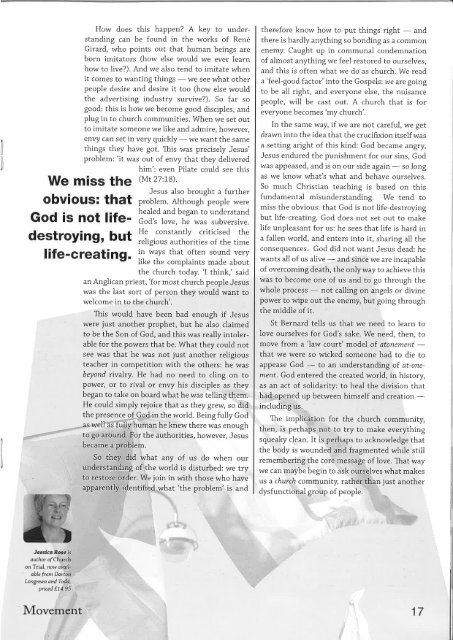Movement 134
Create successful ePaper yourself
Turn your PDF publications into a flip-book with our unique Google optimized e-Paper software.
How does this happen? A key to understanding<br />
can be found in the works of Ren6<br />
Girard, who points out that human beings are<br />
born imitators (how else would we ever learn<br />
how to live?). And we also tend to imitate when<br />
it comes to wanting things we see<br />
-<br />
what other<br />
people desire and desire it too (how else would<br />
the advertising industry survive?). So far so<br />
good: this is how we become good disciples, and<br />
plug in to church communities. When we set out<br />
to imitate someone we like and admire, however,<br />
envy can set in very quickly we want the same<br />
things they have got. This -<br />
was precisely Jesus'<br />
problem: 'it was out of envy that they delivered<br />
him': even Pilate could see this<br />
(Mt 27:18).<br />
We miSS the<br />
obvious: that o,J;:H iil?::"ri-in,?T:::<br />
God is not tife- 3:#,';xl,T:Ti:::ff'"":il"1<br />
destroying, but ffi*:::'j:il'J,*i'j**.i1,,*:<br />
I ife-c reati ng. ilJ,?"' .ffi;|i:: ;:::.ff:I<br />
the church today. 'I think,' said<br />
an Anglican priest, 'for most church people Jesus<br />
was the last sort of person they would want to<br />
welcome in to the church'.<br />
This would have been bad enough if Jesus<br />
were just another prophet, but he also claimed<br />
to be the Son of God, and this was really intolerable<br />
for the powers that be. What they could not<br />
see was that he was not just another religious<br />
teacher in competition with the others: he was<br />
beyond rivalry. He had no need to cling on to<br />
power, or to rival or envy his disciples as they<br />
began to take on board what he was telling them.<br />
He could simply rejoice that as they grew, so did<br />
the presence of God in the world. Being fully God<br />
as well as fullyhuman he knew there was enough<br />
to go around. For the authorities, however, Jesus<br />
became a problem.<br />
So they did what any of us do when our<br />
understanding of the world is disturbed: we try<br />
to restore order. We join in with those who have<br />
apparently identified what 'the problem' is and<br />
therefore know how to put things right -<br />
and<br />
there is hardly anything so bonding as a common<br />
enemy. Caught up in communal condemnation<br />
of almost anything we feel restored to ourselves,<br />
and this is often what we do as church. We read<br />
a'feel-good factor' into the Gospels: we are going<br />
to be all right, and everyone else, the nuisance<br />
people, will be cast out. A church that is for<br />
everyone becomes 'my church'.<br />
In the same way, if we are not careful, we get<br />
drawn into the idea that the crucifixion itself was<br />
a setting aright of this kind: God became angry,<br />
Jesus endured the punishment for our sins, God<br />
was appeased, and is on our side again so long<br />
-<br />
as we know what's what and behave ourselves.<br />
So much Christian teaching is based on this<br />
fundamental misunderstanding. We tend to<br />
miss the obvious: that God is not life-destroying<br />
but life-creating. God does not set out to make<br />
life unpleasant for us: he sees that life is hard in<br />
a fallen world, and enters into it, sharing all the<br />
consequences. God did not want Jesus dead: he<br />
wants all of us alive and since we are incapable<br />
-<br />
of overcoming death, the only way to achieve this<br />
was to become one of us and to go through the<br />
whole process not calling -<br />
on angels or divine<br />
power to wipe out the enemy, but going through<br />
the middle of it.<br />
St Bernard tells us that we need to learn to<br />
love ourselves for God's sake. We need, then, to<br />
move from a 'law court' model of atonement -<br />
that we were so wicked someone had to die to<br />
appease God -<br />
to an understanding of at-onement.<br />
God entered the created world, in history,<br />
as an act of solidarity: to heal the division that<br />
had opened up between himself and creation -<br />
including us.<br />
The implication for the church community,<br />
then, is perhaps not to try to make everything<br />
squeaky clean. It is perhaps to acknowledge that<br />
the body is wounded and fragmented while still<br />
remembering the core message of love. That way<br />
we can maybe begin to ask ourselves what makes<br />
us a church community, rather than just another<br />
dysfunctional group of people.<br />
Jessica Roce ls<br />
author ofChurch<br />
on Trial, now available<br />
from Darton<br />
Longman and Todd,<br />
priced 814.95<br />
<strong>Movement</strong> 17

















